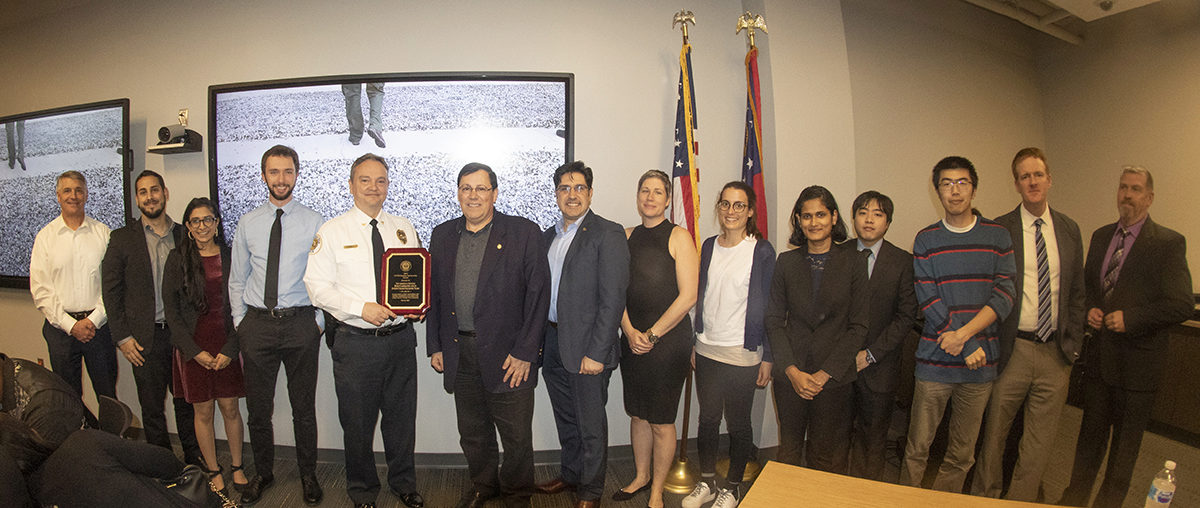
Teams Work. The team of officers, students, administrators, and research engineers who have made the partnership a win-win for ASDL and for the GTPD are, from left: Mark Demyanek, Nelson Ojeda Quiles, Shilpa Ravoory, Christopher Eggert, Chief Robert Connolly, ASDL director Dimitri Mavris, Dr. Michael Balchanos, Dr. Olivia Pinon-Fischer, Domitille Commun, Archana Tikayat Ray, Kohei Harada, Zujia Huang, Dr. Scott Duncan, and Jeffrey Hunnicutt
A strategic partnership between the Aerospace Systems Design Lab (ASDL) and the Campus Police was publicly recognized March 11 during the Georgia Tech Police Department's Annual Awards Ceremony.
Receiving the 2019 Student Partnership Award were the faculty, researchers, and students of ASDL's Grand Challenge Initiative, who have worked with the GTPD to better coordinate and execute public safety efforts on campus. The award annually acknowledges a Georgia Tech student or student group that has gone above and beyond the normal responsibilities to support the mission of the Georgia Tech Police Department.
That description fairly well describes the ASDL team that began working with the GTPD during fall of 2018 to develop approaches for problems like pedestrian and traffic safety. Working under the tutelage of ASDL director Dimitri Mavris, the Grand Challenge team has combined big data and modern technology to widen the scope of what's possible.
"The campus footprint has been rapidly growing, making the job of the GTPD much more demanding," said ASDL research engineer Michael Balchanos who has spearheaded the partnership's work. "To address this, we've been able to introduce advanced methods and modeling tools to traffic and ground activity data to gain deeper insight and predict trends in mobility and pedestrian safety."
That insight was well-appreciated by the campus police.
"The students in the ASDL have brought our work up to a whole new level," said GTPD's Physical Security Specialist Jeffery T. Hunnicutt. "By the end of this year, we are going to have a drone to help us with safety surveillance, so we'll be able to reduce the amount of time it takes to put eyes on the scene of an emergency. The drone will also be able to help us maintain greater situational awareness of traffic problems."
Mavris had plenty of praise to return to his friends in the GTPD.
"The Police Department at Georgia Tech has some very progressive, forward-thinking leaders. For all of the ideas that our Team brought to them, they were equally excited and curious about innovations that can improve their work. We are excited to continue working with them, going forward."
Among the partnership's accomplishments to date:
-
The Grand Challenge team analyzed camera feeds, and developed advanced analytics to plot the movement of pedestrians, vehicles, scooters and other mobility units to predict collisions and near-misses. Application of this analysis can directly impact officer assignments as well as traffic and safety recommendations for the location of stop lights, crosswalks, and sidewalks.
-
The Grand Challenge team developed a “digital twin” of Georgia Tech campus traffic to simulate pedestrian and vehicular movement based on class schedules -- when students are moving from one location to another -- and open source traffic data. This data supports a forecasting environment for traffic incident hotspot detection, which could lead to improved traffic flow arrangements.
-
Currently, the Grand Challenge project is targeting pedestrian safety and the safe use of unmanned aircraft systems (UAS) in a densely populated urban environment. Students are using ASDL’s “digital twin” of the physical campus traffic and enabling machine learning algorithms to create UAS flight paths that avoid the most heavily trafficked thoroughfares. Use of UAS by GTPD is expected to be transformational for campus security and emergency preparedness.
-
The Grand Challenge team is inventorying the data collected by multiple, disparate technologies used by the police department, in order to define their relationships and understand the connections between these systems. The goal is to eliminate redundancies, identify deficiencies, increase efficiencies, save money, and facilitate system integration.